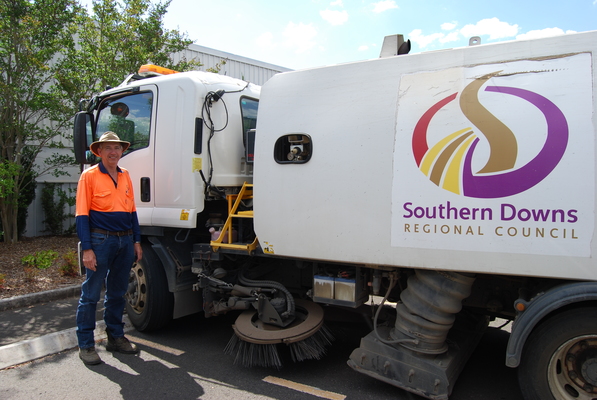A LOCAL street sweeper has hit back at recent claims that there is no need for sweeping works to be done in some parts of the region.
Southern Downs Regional Council’s Street Sweeper Operator, Warren Austin said street sweeping was a vital operation that many residents take for granted or do not understand the importance of.
According to council some of their street sweeping activities have recently come under fire from a couple of Southern Downs residents, who suggested it was simply a waste of ratepayers’ money.
However, Mr Austin begs to differ. In response to these complaints Mr Austin said street sweeping is of paramount importance.
“Most residents would be completely unaware that, just in our northern part of the Southern Downs region, Council’s street sweeper collects, on average, 21 tonnes of dirt, debris and other material each week,” he said.
“There is a lot of fine dust that people don’t see that is swept up by the sweeper, and for those people that complain that the streets are clean so why waste money on street sweeping, I would remind them that the streets are clean because we do regular street sweeping,” he said.
In the 2014/15 financial year, Council’s street sweepers collected an incredible 1546.52 tonnes of debris from across the whole Southern Region.
Of that amount, 840.96 tonnes was collected in the northern part of the region, with the balance 705.56 tonnes collected by Council’s Street Sweeper Operator, Mark Rouen, in the southern part of the region.
“Just imagine what our streets would look like if they were left unattended,” Mr Austin said.
“The dust, dirt, screenings, cigarette butts, papers, bottles and general detritus would build up and become unsightly.
“Not only that, but water would be unable to reach the storm water drains because they would be clogged with debris.
“My role involves sweeping the main streets of Warwick, Allora, Killarney, Leyburn and Pratten; doing fortnightly sweeps of the entire Warwick CBD; and monthly sweeps of national highways,” he said.
In addition to the scheduled sweeping routes, Council also receives a lot of requests from the Queensland Department of Transport and Main Roads to do clean-up sweeping of materials like broken glass, oil, and concrete after spills or accidents, and the State Government pays Council to do this work on their behalf.
“Street sweeping serves a number of important purposes,” he said.
“It keeps our region clean and tidy, which creates a positive first impression for visitors and for residents and it also can pick up harmful debris and substances that could contaminate the environment if they were left on the streets and made their way into stormwater drains and into our streams and waterways.”







